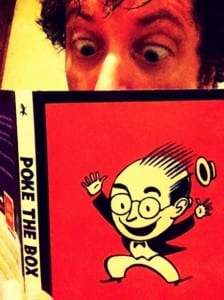It never ceases to amaze me how many people I come across who tell me that they don’t read books. When someone tells me this I am always reminded of the following quotes about books and reading:
“The man who does not read good books has no advantage over the man who can’t read.” – Mark Twain
“A capacity and taste for reading gives access to whatever has already been discovered by others.” – Abraham Lincoln
“Books are the bees which carry the quickening pollen from one to another mind.” – James Russell Lowell
From as early as I can recall I’ve always had a love of books and I’ve fond memories of spending lots of time in our local library, back in Derry, discovering new worlds and exciting things about our own world. As I grew up my love of books remained and I constantly have a book on the go (I’m currently finishing The Tipping Point, by Malcolom Gladwell. An entertaining and highly recommended read).
For those of you who have been reading my posts regularly, here on Bloggertone, you will know that for the last 12 months I have been on a journey of getting myself organised and trying to be as effective as possible. One of the areas I’ve struggled with and continue to struggle with, is how to get the most out of a good book, especially one in which I’m learning lots of new things that I might be able to apply in my life.
In the course of reading I often come across something really interesting and I make a mental note that this is a really good idea. However I often never go beyond this mental note and the opportunity for putting learning into practice is lost.
Before going any further I think it’s important to clarify that from this point forward I’m referring to reading of non-fiction material.
A few months ago I came across the blog of Michael Hyatt, who is the Chairman of Thomas Nelson Publishers, the largest Christian publishing company in the world and the seventh largest trade book publishing company in the U.S. I’ve been learning a lot recently on this blog, however the real gems I’ve come across have been when Michael has shared his insights into books and reading.
The “Net Out”
This week I came across a post that Michael wrote in September 2010, in which he shared his thoughts on how to retain more of what you read. I was so struck by what he shared that not only will I be putting it into practice but I wanted to share it with my readers here on Bloggertone.
The essence of the post is an overview of a technique called a “Net Out”, in which you “distill the key insights from the book and then determine what you are going to do differently in your life as a result”. It is recommended to keep the summary to no more than one page. The suggested structure of the “Net Out” is as follows.
- Bibliographic Heading. The title of the book, the author(s), the reviewer name (i.e. your own name), and the date of the review.
- Quick Summary. An overview in no more than one paragraph of what the book is about
- Key Insights. You should never sit down and read a book without a pen. Get into the habit of highlighting the things you read in a book that capture your attention. When you’ve finished the book go back and select your top 5 or 6 insights and put them into your “Net Out”. Remember to reference the page number so that you can return to the book if you want to read the detail again.
- Personal Application. This is the most important part. List two or three things that you are going to do differently as a result of reading the book.
There is an optional fifth section in which you list your favourite quotes from the book. If this content is included it will more than likely push your summary onto a second page.
So there you have it. I think this looks like a really effective way to ensure learning comes out of the books that you read. I’d be interested in hearing your thoughts. What do you think of this approach?
Do you have your own approach to ensuring that you get the most out of your reading? Let us know in the comments.
Image credited to http://www.flickr.com/photos/moriartys/


